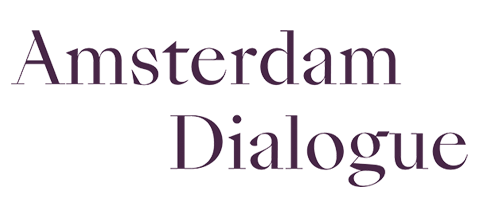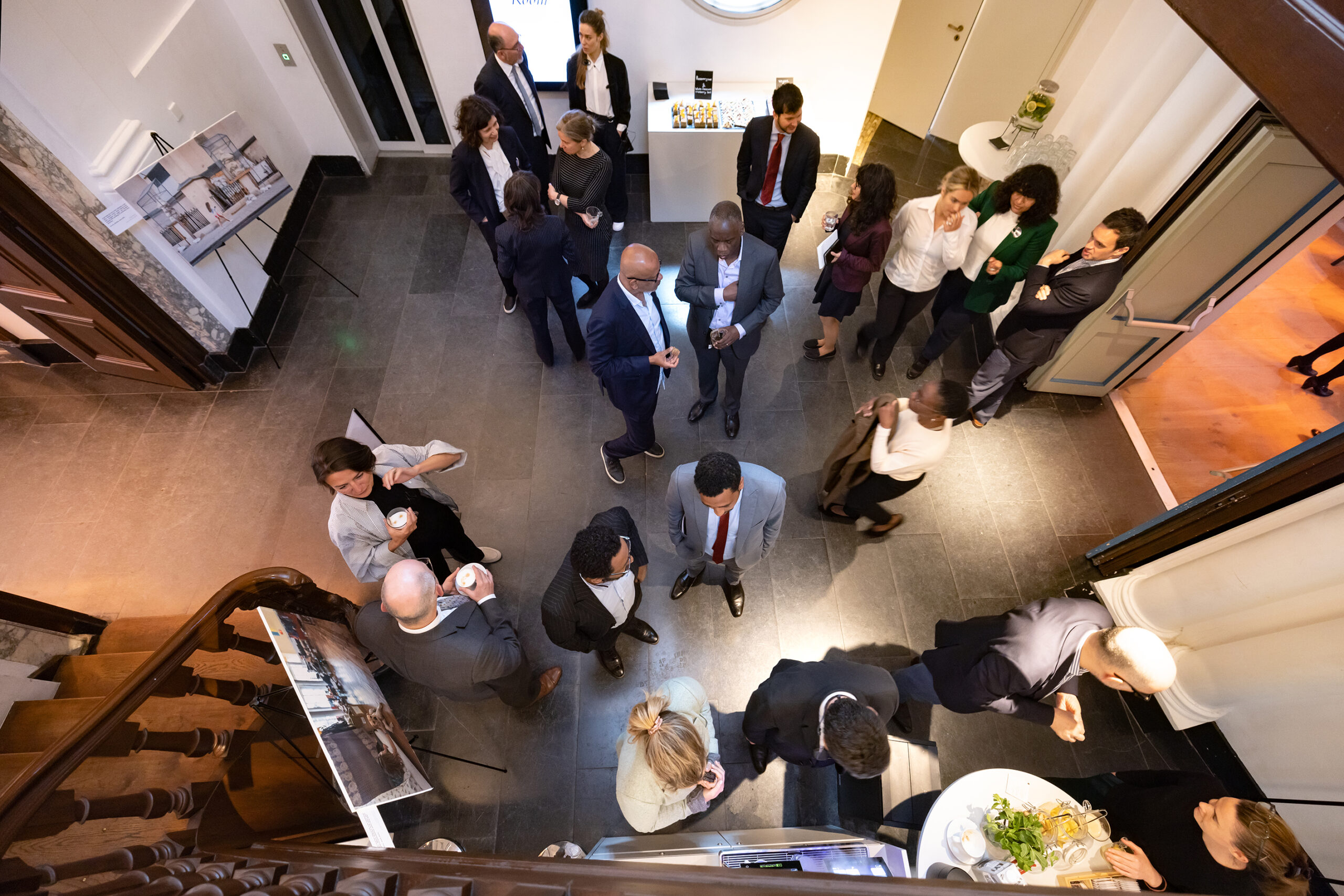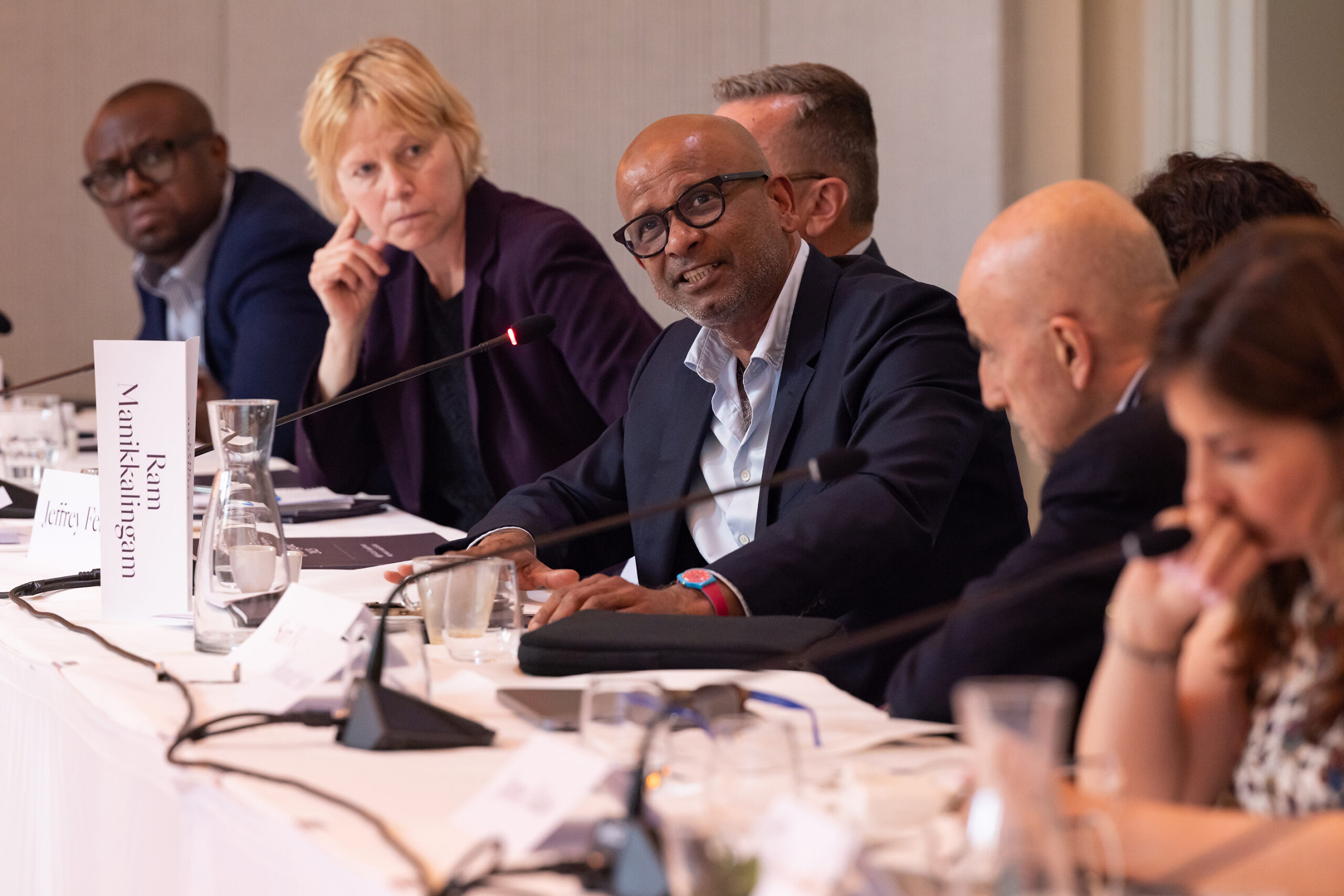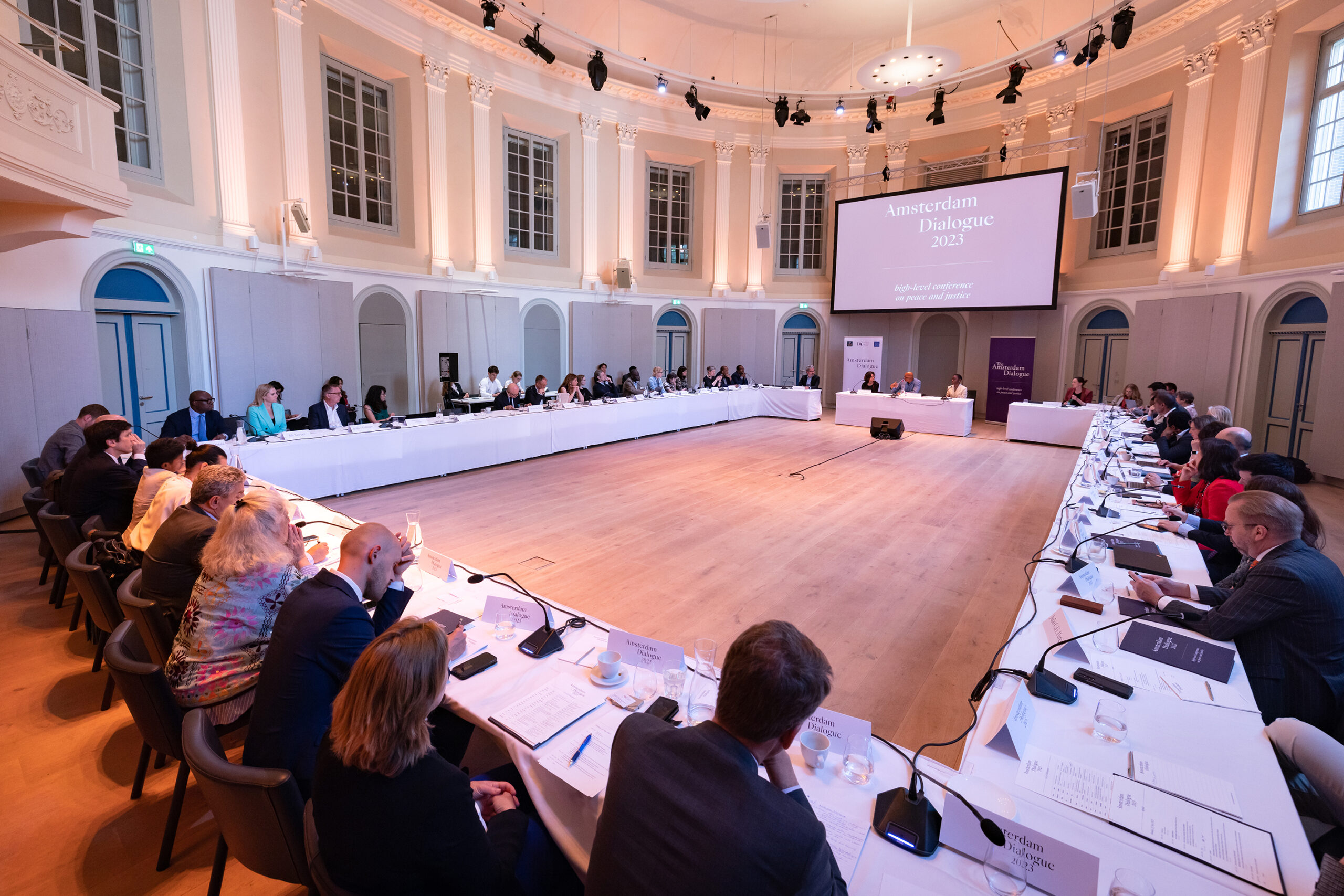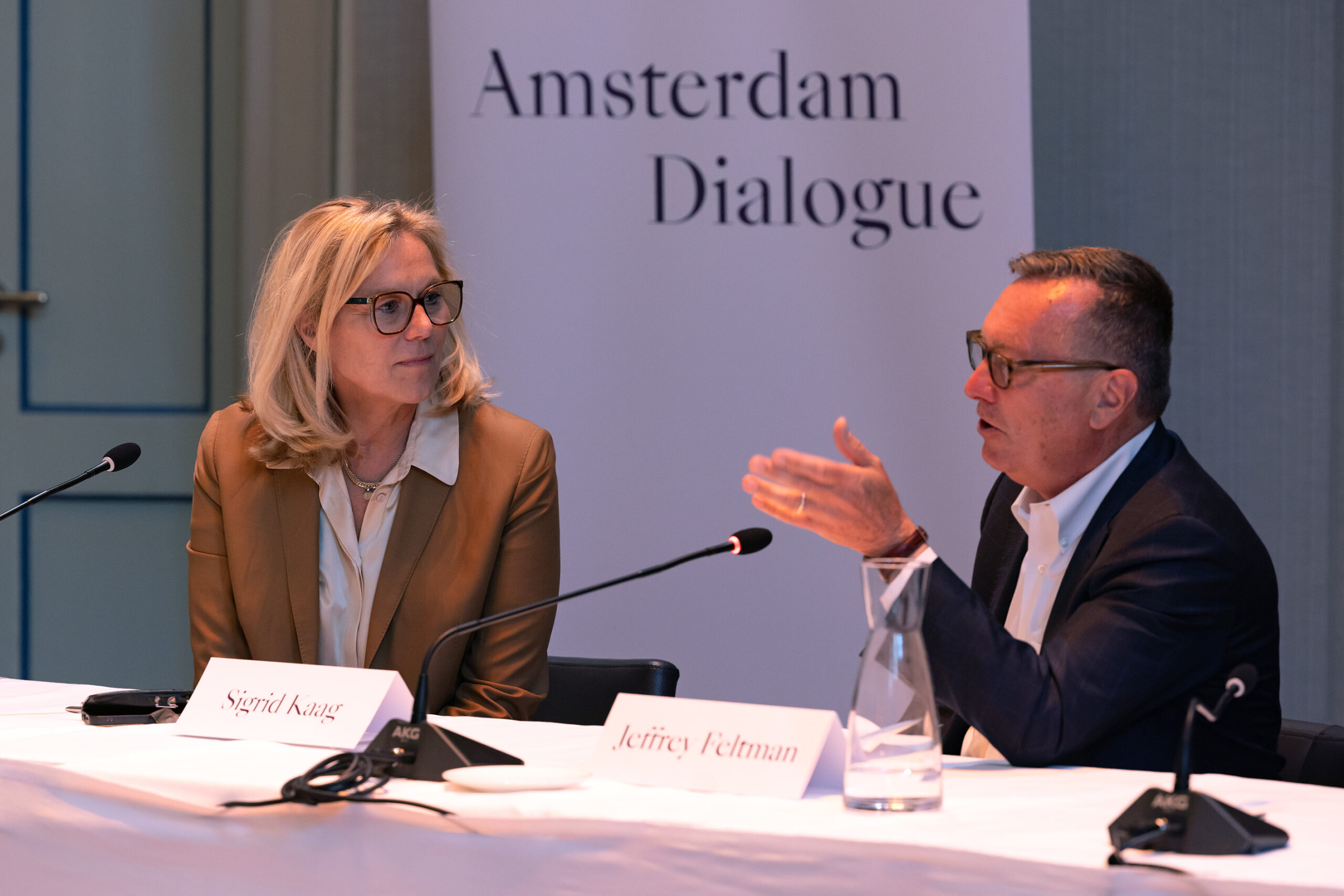Click here to view the conference report
The Amsterdam Dialogue 2023 brought together a diverse group of high-level participants from government, international organisations, and peace and justice communities. Together, they delved into the complexities of specific conflicts while exploring potential approaches and unique challenges facing peace and justice today.
The event kicked off with a lively discussion among the lead organisers unpacking the connections between political stability, and peace and justice. Comfort Ero, CEO and President of International Crisis Group (Crisis Group), Sari Bashi, Human Rights Watch’s (HRW) Chief Programme Manager, and Ram Manikkalingam, Director of the Dialogue Advisory Group (DAG) shared views on how their different approaches could help or hinder one another.
This was followed by a compelling session on Ethiopia with Redwan Hussien, Minister & National Security Advisor of the Prime Minister of Ethiopia and Getachew Reda, President of the Tigray Interim Regional Administration, moderated by Payton Knopf, consultant at DAG. Discussions revolved around the Cessation of Hostilities that marked a rare success story for peace. The panel highlighted the importance of finding common ground among conflicting parties and the role of discreet communication in building trust and progressing towards formal negotiations.
The concluding panel of the first day of the Amsterdam Dialogue 2023 explored challenges in the global multilateral system with Deputy Prime Minister and Minister of Finance of the Netherlands, Sigrid Kaag, moderated by Jeffrey Feltman, Member of DAG’s Board of Advisors. Discussions highlighted global inequality and the rise of alternative political structures. Urgent action, adaptive frameworks, justice, and accountability were underscored as essential for global stability and positive change.
Afghanistan took centre stage during the second day’s opening panel, where Mahbouba Seraj, Executive Director of the Afghan Women Skills Development Center, Ayesha Wolasmal, Senior Humanitarian Consultant at the Bill & Melinda Gates Foundation, and moderator Graeme Smith, International Crisis Group’s Senior Consultant on Afghanistan, discussed the challenges of navigating the complex realities of the country. The panel illuminated the dire humanitarian consequences of the Taliban’s consolidation of power after the U.S. withdrawal. Engaging the Taliban was explored, emphasizing the need for balancing addressing the humanitarian crisis while protecting human rights.
One year into Russia’s invasion of Ukraine, Nadia Volkova, Founder & Director of Ukrainian Legal Advisory Group, Ludmila Nemiriya, Journalist & General Producer at UKRLife.TV, and moderator Olga Oliker, International Crisis Group’s Program Director for Europe and Central Asia, examined the implications of a protracted conflict in Ukraine. The complexities of international mediation and the impact of sanctions were discussed, along with the challenges of restoring societal cohesion and democracy in a conflict-affected nation.
Panellists Pierre Esperance, Executive Director of the National Network for the Defense of Human Rights (RNDDH) and Jean-Martin Bauer, Country Director Haiti for the United Nations World Food Programme spoke on Haiti, while Ida Sawyer, HRW’s Director for Crisis and Conflict Division moderated. They discussed the convergence of gang violence, political instability, and a dire humanitarian crisis leading to a multifaceted crisis. The focus was on the urgent need to rebuild institutions, foster the rule of law, and the potential role of international intervention.
Panellists Hanna Serwaa Tetteh, Special Envoy for the Horn of Africa, United Nations, Monica Juma, National Security Advisor, Republic of Kenya, and moderator Barney Afako, Senior Mediation Advisor, United Nations spoke on “African Solutions to Global Challenges”. The panel delved into the concept of ‘African solutions to African problems’, reflecting on the need for local ownership as well as challenges faced by regional and international institutions in responding to conflicts on the African continent. Participants explored the successes and limitations of subregional and regional organizations and emphasized the need for comprehensive reform, including stronger institution-building efforts, greater involvement of civil society, and addressing economic disparities.
The impact of sanctions as a policy tool in conflict settings was dissected in a panel dedicated to exploring How Sanctions Help and Hinder Peace, featuring the Norwegian Centre for Conflict Resolution (NOREF)’s Director Dag Nylander, Centre for Humanitarian Dialogue’s Deputy Director for Mediation Support and Policy David Lanz, and International Crisis Group’s Senior Analyst for the U.S. Program Delaney Simon as moderator. This discussion underscored the dual nature of sanctions, acknowledging their positive impact on peace processes while addressing the negative consequences, such as the risk of escalating violence and limited effectiveness in instigating political change.
Concluding the event was a panel focused on the pursuit of lasting peace in light of recent developments in Sudan. The panel featured panellists Kholood Khair, Founder & Director of Confluence Advisory, Montasir al-Tayeb Ibrahim, Professor of Microbiology at the University of Khartoum, El-Shafie Khidr, Sudanese Politician and Writer, and Luvy Rocha Rappaccioli Chief Programme Manager at DAG, who moderated the discussion. The panel addressed efforts to stop the violence, ensure humanitarian access, and move towards a sustainable peace. Discussions centred on the importance of civilian inclusivity, the role of international pressure, and the pursuit of accountability as essential elements in building a foundation for lasting peace and democracy.
Agenda day 1, Monday 22 May
12:00 – 13:15 Registration
13:15 – 13:30 Opening remarks
- Juan Garrigues, Deputy Director, Dialogue Advisory Group
13:30 – 14:30 Peace & Justice: Unpacking Political Instability
- Comfort Ero, President & CEO, International Crisis Group
- Sari Bashi, Program Director, Human Rights Watch
- Ram Manikkalingam, Director, Dialogue Advisory Group
14:30 – 15:00 Break
15:00 – 16:30 Ethiopia
- Redwan Hussien, Minister & National Security Advisor, Office of the Prime Minister of the Federal Democratic Republic of Ethiopia
- Getachew Reda, President, Tigray Regional President Office in Ethiopia
- Moderator: Payton Knopf, Consultant, Dialogue Advisory Group
- First comment: Mohammed Guyo, Special Envoy, Intergovernmental Authority on Development
16:30 – 17:45 War, Peace and the Global Order
- Sigrid Kaag, Minister & Deputy Prime Minister, Ministry of Finance of the Netherlands
- Moderator: Jeffrey Feltman, Board Member, Dialogue Advisory Group Advisory Board
18:45 – 19:30 Reception & live music by Duendes
19:30 Dinner
Agenda day 2, Tuesday 23 May
09:00 – 09:30 Welcome
09:30 – 10:30 Parallel Break-out Panels
Ukraine
- Nadia Volkova, Founder and Director, Ukrainian Legal Advisory Group
- Ludmila Nemiriya, Journalist & General Producer, UKRLife.TV
- Moderator: Olga Oliker, Program Director for Europe and Central Asia, International Crisis Group
Haiti
- Pierre Esperance, Executive Director, National Network for the Defense of Human Rights (RNDDH)
- Jean-Martin Bauer, Country Director Haiti, United Nations World Food Programme
- Moderator: Ida Sawyer, Director Crisis and Conflict Division, Human Rights Watch
- 1st comment: Antonia Urrejola, Former Foreign Minister, Ministry of Foreign Affairs Chile
11:45 – 12:15 Break
12:15 – 13:15 Perspectives from the African Continent
- Hanna Serwaa Tetteh*, Special Envoy for the Horn of Africa, United Nations Monica Juma, National Security Advisor, Republic of Kenya
- Moderator: Barney Afako, Senior Mediation Advisor, United Nations
13:15 – 14:30 Lunch
14:30 – 15:30 How Sanctions Help and Hinder Peace
- Dag Nylander, Director, Norwegian Centre for Conflict Resolution
- David Lanz, Deputy Director Mediation Support and Policy, Centre for Humanitarian Dialogue
- Moderator: Delaney Simon, Senior Analyst for the U.S. Program, International Crisis Group
- 1st comment: Rim Turkmani, Director of the London School of Economics Syria Conflict Research Programme
15:30 – 16:00 Break
16:00 – 17:15 Sudan
- Kholood Khair*, Founder & Director, Confluence Advisory
- Montasir al-Tayeb Ibrahim*, Professor of Microbiology, University of Khartoum in Sudan
- Moderator: Luvy Rocha Rappaccioli, Chief Programme Manager, Dialogue Advisory Group
17:15 – 17:30 Closing Remarks
- Vlad Corbu, Deputy Director, Dialogue Advisory Group
- Paula de Castro, Senior Programme Manager, Dialogue Advisory Group
*Panelists with an asterisk before their name attended the conference virtually.
